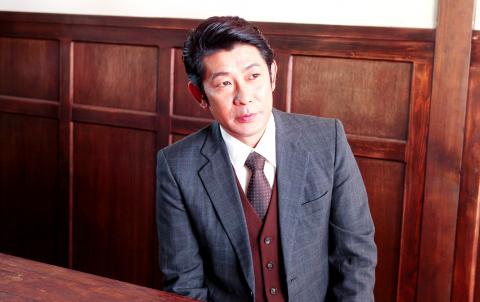Readers familiar with cult American films might remember Jim Jarmusch’s 1989 movie Mystery Train, which not only put the director on the world map but also turned the then-22-year-old Japanese actor Masatoshi Nagase — a high school drop-out from the countryside — into a star.
Fast forward to 2013 and Nagase is in Taiwan as part of the cast of Kano, a baseball drama about a 1931 Chiayi high school team. The film, backed by Wei Te-sheng (魏德聖), is directed by Seediq Bale (賽德克‧巴萊) alumnus Umin Boya.
Filming has been going on in five cities around Taiwan since November, from Chiayi to Keelung, and is set to wrap at the end of March.

Photo: Taipei Times
An all-Taiwanese cast comprised of mostly unknown faces, as well as four well-known Japanese actors playing pivotal roles, is bringing the Wei-scripted story to life.
Among the four Japanese actors, Nagase, now 46, has been cast as a strict Japanese high school baseball coach. During a recent press conference in Chiayi, Nagase said he was enjoying his time in Taiwan, even posting photos of various Taiwan scenic locations on his Facebook page.
big budget flick
Nagase told reporters at the conference in Chiayi that he was impressed by the Hollywood-style set that has been built in Chiayi, confessing: “A movie set of that size is rare even in Japan today.”
When asked by the Taipei Times if Jarmusch was aware of his starring role in Kano, Nagase said in English: “I’m not sure if he knows yet, but I hope he will find out later. I love Jim Jarmusch.”
According to the producers, over NT$50 million has been spent to build a 1931-era set, and there are plans to retain some of the Kano main street set as a tourist attraction before and after the movie opens next year.
a taste of old chiayi
There’s a huge wooden replica of an old Japanese-style Chiayi train station from the 1930s, complete with a bright red Japan Post Office collection box made of cardboard, several fake telephone poles with fake telephone wires strung up in the air, and emergency sand containers used to put out fires in the Japanese colonial period days before fire trucks and fire hydrants were put into service here.
The three other actors from Japan cast in the film are Takao Ozawa, Maki Sakai and Togo Ikawa.
Putting Nagase in Kano appears to be a stroke of casting genius since Jarmusch is a big name in America and Europe and it is hoped that Nagase’s star turn will bring in Western viewers to the baseball drama — not to mention his many fans in Japan where he has appeared on TV shows, movies and in an assortment of popular and often humorous TV commercials over the past 20 years.

The primaries for this year’s nine-in-one local elections in November began early in this election cycle, starting last autumn. The local press has been full of tales of intrigue, betrayal, infighting and drama going back to the summer of 2024. This is not widely covered in the English-language press, and the nine-in-one elections are not well understood. The nine-in-one elections refer to the nine levels of local governments that go to the ballot, from the neighborhood and village borough chief level on up to the city mayor and county commissioner level. The main focus is on the 22 special municipality

The People’s Republic of China (PRC) invaded Vietnam in 1979, following a year of increasingly tense relations between the two states. Beijing viewed Vietnam’s close relations with Soviet Russia as a threat. One of the pretexts it used was the alleged mistreatment of the ethnic Chinese in Vietnam. Tension between the ethnic Chinese and governments in Vietnam had been ongoing for decades. The French used to play off the Vietnamese against the Chinese as a divide-and-rule strategy. The Saigon government in 1956 compelled all Vietnam-born Chinese to adopt Vietnamese citizenship. It also banned them from 11 trades they had previously

In the 2010s, the Communist Party of China (CCP) began cracking down on Christian churches. Media reports said at the time that various versions of Protestant Christianity were likely the fastest growing religions in the People’s Republic of China (PRC). The crackdown was part of a campaign that in turn was part of a larger movement to bring religion under party control. For the Protestant churches, “the government’s aim has been to force all churches into the state-controlled organization,” according to a 2023 article in Christianity Today. That piece was centered on Wang Yi (王怡), the fiery, charismatic pastor of the

Hsu Pu-liao (許不了) never lived to see the premiere of his most successful film, The Clown and the Swan (小丑與天鵝, 1985). The movie, which starred Hsu, the “Taiwanese Charlie Chaplin,” outgrossed Jackie Chan’s Heart of Dragon (龍的心), earning NT$9.2 million at the local box office. Forty years after its premiere, the film has become the Taiwan Film and Audiovisual Institute’s (TFAI) 100th restoration. “It is the only one of Hsu’s films whose original negative survived,” says director Kevin Chu (朱延平), one of Taiwan’s most commercially successful